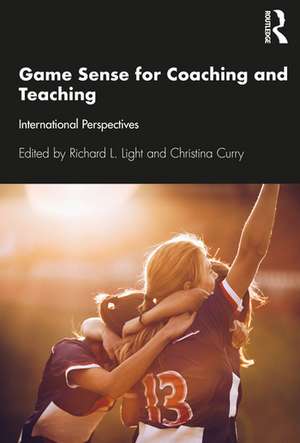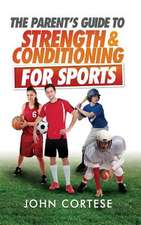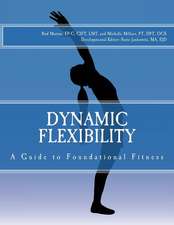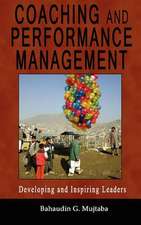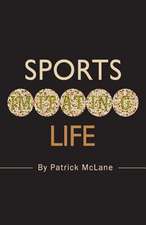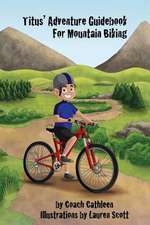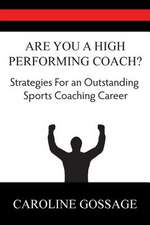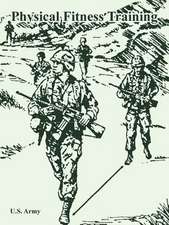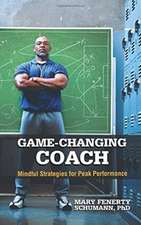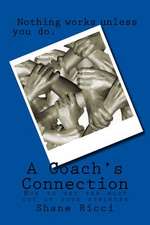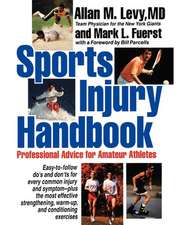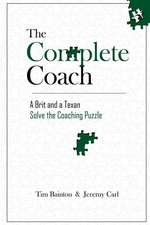Game Sense for Teaching and Coaching: International Perspectives
Editat de Richard Light, Christina Curryen Limba Engleză Paperback – 16 mar 2021
Game Sense for Coaching and Teaching provides an understanding of how an Australian approach to coaching has grown and developed as it has been taken up across the globe. While the focus is on Game Sense, the book also offers insights into how any coaching or physical education (PE) teaching approach changes as it is adapted to different contexts across the world, examining the theoretical, historical and philosophical foundations of sport coaching and teaching in schools.
This book is particularly useful for undergraduate and post-graduate sport coaching and PE courses but is also likely to be of interest for all practicing sports coaches or physical education teachers and lecturers.
| Toate formatele și edițiile | Preț | Express |
|---|---|---|
| Paperback (1) | 280.28 lei 22-36 zile | +19.00 lei 5-11 zile |
| Taylor & Francis – 16 mar 2021 | 280.28 lei 22-36 zile | +19.00 lei 5-11 zile |
| Hardback (1) | 739.40 lei 43-57 zile | |
| Taylor & Francis – 16 mar 2021 | 739.40 lei 43-57 zile |
Preț: 280.28 lei
Nou
Puncte Express: 420
Preț estimativ în valută:
53.63€ • 56.15$ • 44.38£
53.63€ • 56.15$ • 44.38£
Carte disponibilă
Livrare economică 17-31 martie
Livrare express 28 februarie-06 martie pentru 28.99 lei
Preluare comenzi: 021 569.72.76
Specificații
ISBN-13: 9780367741587
ISBN-10: 036774158X
Pagini: 250
Ilustrații: 8 Tables, black and white; 11 Illustrations, black and white
Dimensiuni: 156 x 234 x 25 mm
Greutate: 0.36 kg
Ediția:1
Editura: Taylor & Francis
Colecția Routledge
Locul publicării:Oxford, United Kingdom
ISBN-10: 036774158X
Pagini: 250
Ilustrații: 8 Tables, black and white; 11 Illustrations, black and white
Dimensiuni: 156 x 234 x 25 mm
Greutate: 0.36 kg
Ediția:1
Editura: Taylor & Francis
Colecția Routledge
Locul publicării:Oxford, United Kingdom
Public țintă
General, Professional, and UndergraduateCuprins
Introduction
1. Game Sense: Its History, Development and Future
Part 1: Theorizing Game Sense
2. Humanism and Holism: The Philosophical Foundations of Game Sense
3. Reconciling Approaches: Informing Game Sense Coaching Pedagogy with a Constraints-led Perspective
4: The Body and Learning through Game Sense
Part 2: Game Sense and Culture
5. Game Sense, Culture and Learning: A Focus on Asia
6. The Influence of Context on Teachers’ and Coaches’ Use of GBA
7. The Influence of Games and Culture on Indigenous AFL and NRL Players’ Development of Expertise
8. Adapting a Game Sense Approach to Coaching Rugby in Chile
9. Ako and Indigenous Athletes: Kaupapa Māori Principles and Game Sense Pedagogy
Part 3: Coaching and Teaching Issues in Game Sense
10. Teaching Decision-making and Creativity as a Vital Issue for Teacher Education – A Qualitative Intervention Study with German Trainee Teachers
11. A Bigger Picture: Aligning Game Sense with Curriculum Standards
12. Discovering Game Shape through Cooperative Team Adventures
13. English and Australian Teachers’ Interpretation and Use of GBA
14. What Do Children Learn from the Game? A Study of Elementary Physical Education in Aichi, Japan
15. Applied Game Sense and Positive Pedagogy in High School Rugby
16. The Utility of Game Sense for PE Teachers, Sport Coaches and Policy-makers: A Models Based Narrative
Part 4: The Development of Game Sense
17. Implementing TGfU in an Australian Independent School: An Affective Journey
18. The Use of Coaching Pods for Coach Education in Croquet Coaching Pods: Possibilities for Game Sense
19. What’s in a Name? The Influence of Game Sense on a New Zealand Basketball Coach’s Practice
20. From the Games Concept Approach to Game Sense to Positive Pedagogy: My Pedagogical Journey
21. Learning from Adaptation Games in a Japanese Basketball Unit
Concluding Thoughts: Game Sense for Teaching and Coaching Globally
1. Game Sense: Its History, Development and Future
Part 1: Theorizing Game Sense
2. Humanism and Holism: The Philosophical Foundations of Game Sense
3. Reconciling Approaches: Informing Game Sense Coaching Pedagogy with a Constraints-led Perspective
4: The Body and Learning through Game Sense
Part 2: Game Sense and Culture
5. Game Sense, Culture and Learning: A Focus on Asia
6. The Influence of Context on Teachers’ and Coaches’ Use of GBA
7. The Influence of Games and Culture on Indigenous AFL and NRL Players’ Development of Expertise
8. Adapting a Game Sense Approach to Coaching Rugby in Chile
9. Ako and Indigenous Athletes: Kaupapa Māori Principles and Game Sense Pedagogy
Part 3: Coaching and Teaching Issues in Game Sense
10. Teaching Decision-making and Creativity as a Vital Issue for Teacher Education – A Qualitative Intervention Study with German Trainee Teachers
11. A Bigger Picture: Aligning Game Sense with Curriculum Standards
12. Discovering Game Shape through Cooperative Team Adventures
13. English and Australian Teachers’ Interpretation and Use of GBA
14. What Do Children Learn from the Game? A Study of Elementary Physical Education in Aichi, Japan
15. Applied Game Sense and Positive Pedagogy in High School Rugby
16. The Utility of Game Sense for PE Teachers, Sport Coaches and Policy-makers: A Models Based Narrative
Part 4: The Development of Game Sense
17. Implementing TGfU in an Australian Independent School: An Affective Journey
18. The Use of Coaching Pods for Coach Education in Croquet Coaching Pods: Possibilities for Game Sense
19. What’s in a Name? The Influence of Game Sense on a New Zealand Basketball Coach’s Practice
20. From the Games Concept Approach to Game Sense to Positive Pedagogy: My Pedagogical Journey
21. Learning from Adaptation Games in a Japanese Basketball Unit
Concluding Thoughts: Game Sense for Teaching and Coaching Globally
Notă biografică
Richard L. Light is author of Game Sense: Pedagogy for participation performance and enjoyment (2013, Routledge) and Professor of Sport Coaching in the College of Education, Health and Human Development at the University of Canterbury, New Zealand. He is a prominent international figure working in sport pedagogy with a focus on athlete-centred approaches. He is well known for his research and writing on Game Sense over the past twenty years and has published many high impact research books on sport coaching and learning. His most recent books include: Applied Positive Pedagogy in sport coaching (2021, Routledge) and Positive Pedagogy for sport coaching (2nd edn) (2019, Routledge), both with Stephen Harvey; Stories of Indigenous success in Australian sport: Journeys to the AFL and NRL, with John Evans (2018, Palgrave MacMillan); and Positive Pedagogy for sport coaching: Athlete-centred coaching for individual sports (2017, Routledge).
Christina Curry PhD is a former Head of Health and Physical Education Department at a secondary school in Sydney, Australia. She completed a PhD in 2013 on the implementation of Teaching Games for Understanding (TGfU) at an independent secondary school in Sydney. She is at Western Sydney University, Australia, where she was Director of Secondary Education and now teaches and conducts research on Leadership, Health and Physical Education, with a focus on Game Sense. She is regularly invited to conduct workshops on Game Sense and Positive Pedagogy for sport coaching, and was involved in its early development.
Christina Curry PhD is a former Head of Health and Physical Education Department at a secondary school in Sydney, Australia. She completed a PhD in 2013 on the implementation of Teaching Games for Understanding (TGfU) at an independent secondary school in Sydney. She is at Western Sydney University, Australia, where she was Director of Secondary Education and now teaches and conducts research on Leadership, Health and Physical Education, with a focus on Game Sense. She is regularly invited to conduct workshops on Game Sense and Positive Pedagogy for sport coaching, and was involved in its early development.
Descriere
Game Sense for Coaching and Teaching provides an understanding of how an Australian approach to coaching has grown and developed as it is taken up across the globe. It also offers insights into how any coaching or PE teaching approach changes as it is adapted to different contexts across the world.
